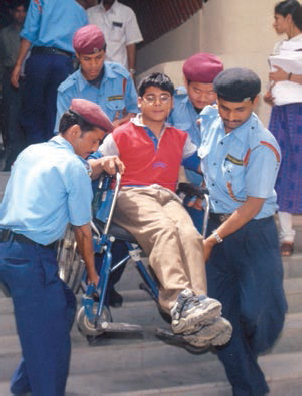Chapter 1 On Equality
Question 1: In a democracy why is universal adult franchise important?
Answer: Universal Adult Franchise is a very important aspect of democratic societies. It means that all adult (those who are 18 and above) citizens have the right to vote irrespective of their social or economic backgrounds. The idea of Universal Adult Franchise is based on the idea of equality because it states that every adult in a country, irrespective of their wealth and the communities he/she belongs to, has one vote.
Question 2: Re-read the box on Article 15 and state two ways in which this Article addresses inequality?
Answer: Article 15 addresses inequality by prohibiting discrimination based on religion, race, caste, gender, place of birth etc. It also addresses inequality by stating that no citizen shall, on grounds only of religion, race, caste, sex, place of birth or any of them, be subject to any disability, liability, restriction or condition with regard to access to shops, public restaurants, hotels and places of public entertainment; the use of wells, tanks, bathing ghats, roads and places of public resort maintained wholly or partly out of State funds or dedicated to the use of the general public.
Question 3: In what ways was Omprakash Valmiki’s experience similar to that of the Ansaris?
Answer: Omprakash Valmiki was discriminated because of his caste, while the Ansaris were discriminated because of their religion. The similarity is that they both were discriminated because of their birth. In both circumstances, their dignity was not honoured. Both of them have suffered unequal treatment and discrimination as they belonged to different castes and religions.
Question 4: What do you understand by the term “all persons are equal before the law”? Why do you think it is important in a democracy?
Answer: The term "all persons are equal before the law" means that every citizen, irrespective of his/her caste, religion, race, or gender, has to obey the same laws. The idea of equality is the very essence of democracy, as it gives equal recognition to all.
Question 5: According to the Rights of Persons with Disabilities Act, 2016, persons with disabilities have equal rights, and that the government should make possible their full participation in society. The government has to provide free education and integrate children with disabilities into mainstream schools. This law also states that all public places including buildings, schools, etc., should be accessible and provided with ramps.
Look at the photograph and think about the boy who is being carried down the stairs. Do you think the above law is being implemented in his case? What needs to be done to make the building more accessible for him? How would his being carried down the stairs affect his dignity as well as his safety?

Question 6: Define the following terms:
a) Universal Adult Franchise: This is a very important aspect of democratic societies. It means that all adult (those who are 18 and above) citizens have the right to vote irrespective of their social or economic backgrounds.
b) Dignity: This refers to thinking of oneself and other persons as worthy of respect.
c) Constitution: This is a document that lays down the basic rules and regulations for people and the government in the country to follow.
d) Civil Rights Movement: A movement that began in USA in 1950s in which African–American people demanded equal rights and an end to racial discrimination.
Question 7: What are the key elements of a democracy?
Answer: The key elements of a democracy are:
• Rule by the people
• Justice and Equality
• Guarantee of basic human rights to every citizen
• The rule of law
• Separation of powers
• Governance for public goods
• Participation of citizen in politics and civic life
Question 8: When person are treated unequally, their dignity is violated. How?
Answer: When person are treated unequally their dignity is violated because they feel humiliated. The dignity of Omprakash Valmiki and the Ansaris was violated because of the way they were treated.
Question 9: What provisions in the constitution of India in respect of recognition of equality.
Answer:
• Every person is equal before law.
• Nobody can be discriminated against the basis of their religion, caste, gender, etc.
• Every person has excess to all public places (He / She has the right to go anywhere, any place in India).
• Untouchability has been abolished.
Question 10: What are the major challenges to democracy?
Answer:
• Growing economic and social inequalities
• Role of anti-social elements
• Corruption and efficiency
• Casteism and communalism
Great
ReplyDelete